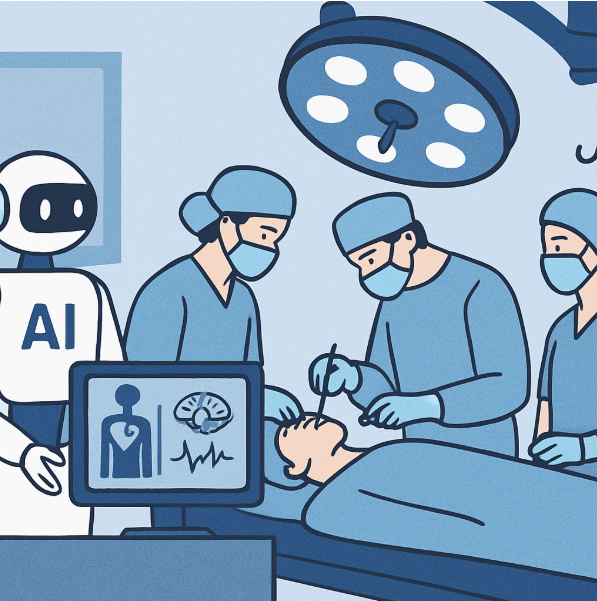The healthcare industry is on the brink of a significant transformation, driven by the integration of artificial intelligence (AI) into hospital operations. This technology is reshaping how medical professionals diagnose, treat, and manage patient care. In this article, we will explore the groundbreaking AI innovations that are revolutionizing hospital operations today, highlighting their potential benefits and the challenges they present.
Artificial intelligence is no longer a futuristic concept; it is a vital tool in modern healthcare. Hospitals are increasingly adopting AI technologies to streamline operations, enhance patient care, and reduce costs. From administrative tasks to clinical decision-making, AI is making its mark in various aspects of hospital operations.
Enhancing Diagnostic Accuracy
One of the most promising applications of AI in hospitals is its ability to improve diagnostic accuracy. AI algorithms can analyze vast amounts of medical data, including medical images, lab results, and patient histories, to assist doctors in making more accurate diagnoses. Machine learning models, for example, can identify patterns and anomalies that may be missed by human eyes, leading to earlier and more precise detection of diseases.
Streamlining Administrative Tasks
AI is also transforming the administrative side of hospital operations. By automating routine tasks such as scheduling, billing, and patient record management, AI frees up valuable time for healthcare professionals to focus on patient care. Natural language processing (NLP) technology can process and understand spoken or written language, enabling voice-activated systems to document patient interactions and update electronic health records (EHRs) seamlessly.

The Role of Medical AI in Patient Care
Medical AI is playing an increasingly important role in patient care, offering new possibilities for personalized treatment plans and improved outcomes.
Personalized Treatment Plans
AI-powered tools can analyze patient data to create personalized treatment plans tailored to individual needs. By considering genetic information, lifestyle factors, and medical history, these tools can recommend optimal treatment strategies, reducing the risk of adverse reactions and improving overall patient outcomes. This level of personalization is paving the way for more effective and efficient healthcare delivery.
Predictive Analytics for Better Outcomes
Predictive analytics, driven by AI, can help hospitals anticipate patient needs and allocate resources more effectively. By analyzing historical data and identifying trends, AI systems can predict patient admissions, optimize staff schedules, and ensure that necessary equipment and resources are available when needed. This proactive approach not only enhances patient care but also improves operational efficiency.
Overcoming Challenges in Healthcare Technology
While AI offers immense potential in revolutionizing hospital operations, its implementation is not without challenges. Understanding and addressing these challenges is crucial for successful integration.
Data Privacy and Security
The use of AI in hospitals requires access to vast amounts of sensitive patient data. Ensuring the privacy and security of this data is a significant concern. Hospitals must implement robust cybersecurity measures to protect patient information from breaches and unauthorized access. Compliance with regulations such as the Health Insurance Portability and Accountability Act (HIPAA) is essential to maintain patient trust and safeguard data.
Integration with Existing Systems
Integrating AI technologies with existing hospital systems can be complex and requires careful planning. Legacy systems may not be compatible with new AI applications, necessitating updates or replacements. Hospitals need to assess their infrastructure and invest in compatible technologies to ensure seamless integration and maximize the benefits of AI.
Future Implications of AI in Healthcare
The future of AI in healthcare holds great promise, with potential implications that extend beyond hospital operations.
Redefining the Role of Healthcare Professionals
As AI takes on more routine tasks, the role of healthcare professionals is evolving. Physicians and nurses can focus more on patient interaction, empathy, and complex decision-making, allowing them to provide more holistic care. AI serves as a valuable tool that augments human expertise rather than replacing it.
Driving Innovation and Collaboration
AI’s impact on healthcare extends to fostering innovation and collaboration among stakeholders. Hospitals, technology companies, and research institutions are working together to develop cutting-edge AI solutions that address specific healthcare challenges. This collaborative approach accelerates the development and adoption of AI technologies, ultimately benefiting patients and the healthcare system as a whole.
Conclusion
Artificial intelligence is revolutionizing hospital operations, offering unprecedented opportunities to enhance patient care and improve operational efficiency. From diagnostic accuracy to personalized treatment plans, AI is reshaping the healthcare landscape. However, successful implementation requires addressing challenges related to data privacy, security, and system integration. As AI continues to evolve, its potential to redefine the role of healthcare professionals and drive innovation is limitless. Embracing AI is not just a technological shift; it is a strategic imperative for hospitals aiming to thrive in the future of healthcare.




